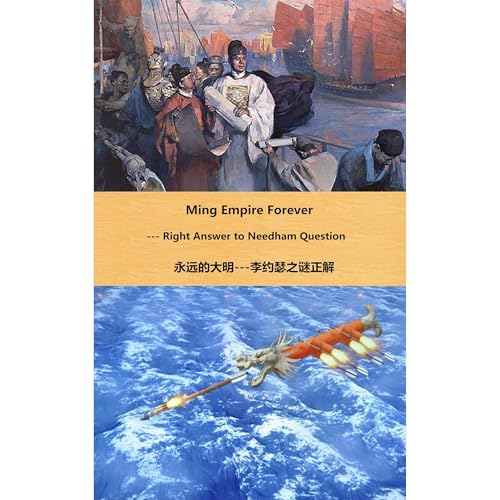
Ming Empire Forever
Right Answer to Needham Question
No se pudo agregar al carrito
Solo puedes tener X títulos en el carrito para realizar el pago.
Add to Cart failed.
Por favor prueba de nuevo más tarde
Error al Agregar a Lista de Deseos.
Por favor prueba de nuevo más tarde
Error al eliminar de la lista de deseos.
Por favor prueba de nuevo más tarde
Error al añadir a tu biblioteca
Por favor intenta de nuevo
Error al seguir el podcast
Intenta nuevamente
Error al dejar de seguir el podcast
Intenta nuevamente
 Exclusivo para miembros Prime: ¿Nuevo en Audible? Obtén 2 audiolibros gratis con tu prueba.
Exclusivo para miembros Prime: ¿Nuevo en Audible? Obtén 2 audiolibros gratis con tu prueba.
Elige 1 audiolibro al mes de nuestra inigualable colección.
Acceso ilimitado a nuestro catálogo de más de 150,000 audiolibros y podcasts.
Accede a ofertas y descuentos exclusivos.
Premium Plus se renueva automáticamente por $14.95 al mes después de 30 días. Cancela en cualquier momento.
Compra ahora por $12.99
-
Narrado por:
-
Virtual Voice
-
De:
-
Frank Wei

Este título utiliza narración de voz virtual
Voz Virtual es una narración generada por computadora para audiolibros..
In 1976, American economist Kenneth Ewart Boulding (1910--1993) call the Question as “Needham's Grand Question”, also known as “Great Divergence” between China and Europe in the 18th to 19th centuries. The essence of “Needham Question” is: why the modern science and technology and industrial revolution did not originate in China, the world most developed and prosperous country in respects of science, technology and economy in late Ming Dynasty (1368--1644)? For this Question, the Chinese and foreign scholars try to solve it from the perspectives of geological environment of China, Chinese language, characters, culture and values, the ways of thinking of Chinese, political institution, philosophy and humanistic ideas of ancient China, the economic pattern of ancient China (small-scale farming economy) and national characters of the Chinese, etc., compare the differences between China and the West in these respects and give different answers to this Question. However, all these answers to the Question do not come to the point, they ignore the abnormal history or dark period of China (similar to the Middle Ages in Europe) after the fall of Ming Empire (1368--1644), and deny the impacts of the actions made by the rulers on the development of a country.
The reason why Joseph Needham has such question is that he has no concept of macro history and knows nothing or little about the history of China after the fall of the Ming Empire in 1644, he does not understand the research method of history and attempts to find the answer to this question from horizontal comparison between China and Europe in the same historical period, it is natural and inevitable that he could not get the right answer to the Question. Looking from the perspective of vertical macro history, the Needham Question is not a question hard to solve.
Contents:
Chapter 1 Introduction
Chapter 2 History of Exchanges between China and the West
Chapter 3 World Influence of Chinese Science and Technology
Chapter 4 Sci-Tech Achievements of China in the Ming Dynasty
1. Advanced and Powerful Firearms of Ming Empire
2. Science and Technology of Ming Empire
3. Summary
Chapter 5 Rise of Capitalist Class and Enlightenment in Late Ming Dynasty
Chapter 6 Democracy and Freedom of Ming Empire and Decline of Autocratic Monarchy
Chapter 7 Low Taxes and State Revenue of Ming Empire
Chapter 8 Little Ice Age and Fall of Ming Empire
Chapter 9 Dark Ages of China
Chapter 10 Sign Unjust Treaties with Foreign Powers
Chapter 11 Conclusion Remarks
Todavía no hay opiniones


